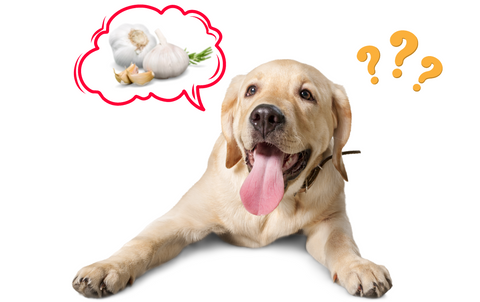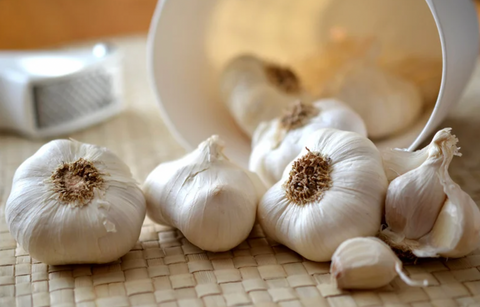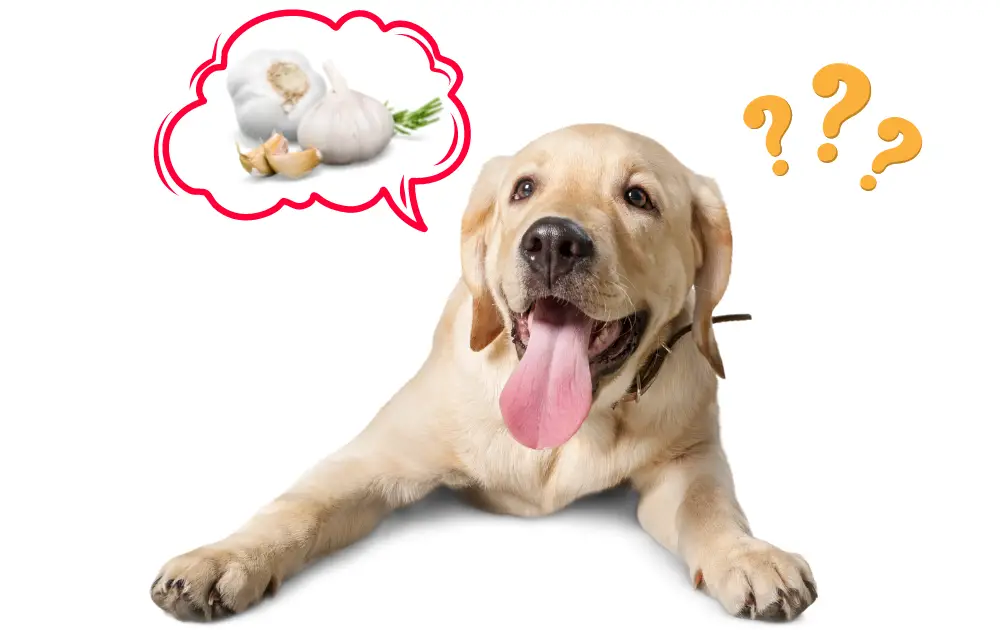
Getting advice on the internet can be a bit of a mixed bag, and it can be hard to find clear answers to your urgent questions. When it comes to your dog’s health and safety, the internet can be an extra-treacherous place. Everyone has an opinion, and many creators have a tendency to exaggerate or dramatize to get clicks.
Take for example the topic of dogs eating garlic.
Some people will tell you that even a single sliver of garlic will kill your dog, while others will say their grandmother’s dog lived to be 25 eating only garlic from her garden.
Well, we’re here to set the record straight. Garlic is not good for your dog in large quantities or on a regular basis, but as with most things, garlic in moderation won’t hurt your pup’s health.
Is Garlic Safe for Dogs?

So, can dogs eat garlic? Yes, they can in extreme moderation, but it’s not something you should ever give them on purpose. If your dog eats a bite of chicken seasoned with garlic or gets ahold of a piece of garlic bread, they will be completely fine.
Dogs need to consume around 15–30 grams of fresh garlic per kilogram of body weight to be at risk for serious illness. To put this into perspective, a very small dog—like a 6 lb Chihuahua—would need to eat 40–80 grams of garlic to be at risk for serious toxicosis. That’s approximately 8–16 whole cloves of garlic!
Here’s a quick rundown of how much garlic your dog would need to eat in order to be at risk of toxicosis.
|
Dog Weight |
Garlic (in grams) |
Garlic Cloves |
|
6 lbs |
40–80 g |
8–16 |
|
10 lbs |
67–135 g |
13–27 |
|
20 lbs |
135–270 g |
27–54 |
|
30 lbs |
204–408 g |
40–81 |
|
40 lbs |
270–540 g |
54–108 |
|
50 lbs |
330–660 g |
66–132 |
|
60 lbs |
405–810 g |
81–162 |
|
70 lbs |
476–952 g |
95–190 |
|
80 lbs |
543–1,086 g |
110–217 |
|
90 lbs |
612–1,224 g |
122–244 |
|
100 lbs |
680–1,360 g |
136–272 |
Be aware that some dogs may be more sensitive to garlic than others.
Toxins in Garlic

Garlic and other members of the allium family (e.g. onions, chives) contain the compound thiosulfate, which is toxic to dogs. Thiosulfate can damage red blood cells and cause serious, life-threatening anemia.
However, a dog needs to ingest a significant amount of thiosulfate to be at risk for anemia, and small amounts won’t cause damage.
The key to avoiding toxicosis is moderation. Not only should you not feed your dog large amounts of garlic, but you also shouldn’t make it a habit to feed them food cooked with garlic. Long-term and consistent exposure to garlic may be damaging to your dog’s health.
Of course, if your dog has only eaten a sliver of garlic or had some table scraps seasoned with garlic, you have nothing to worry about 99% of the time. Dogs are rarely fans of raw garlic, so they are very unlikely to eat enough to put them at risk for toxicosis.
How To Know When It’s a Garlic Emergency

Unfortunately, there are documented cases of dogs experiencing garlic poisoning, and even dying from the resulting oxidative damage. If your dog has eaten a lot of garlic, it’s a good idea to contact your veterinarian and look out for signs of anemia. Symptoms of anemia can appear within hours, or take hold over a week.
Symptoms of anemia in dogs include:
- Lethargy and weakness
- Loss of appetite
- Rapid and shallow breathing
- Dark urine
- Bloody stool, urine, or vomit
Any of these symptoms demonstrate an emergency. If you suspect your dog has eaten a large amount of garlic, contact your vet before these symptoms appear if possible. Most cases of garlic poisoning in dogs are not fatal, but it’s still important to get your dog treated as quickly as possible to prevent long-term damage.
Can Dogs Eat Garlic? The FAQ

With so much conflicting information out there, you probably have more questions about dogs and garlic. Here are some of the most frequently asked questions on the subject.
What happens if my dog eats garlic?
Probably nothing! A small amount of garlic will not hurt your dog, and you should have nothing to worry about.
If your dog has eaten a large amount of garlic—and we mean a large amount of garlic—they could be at risk for anemia and should be checked out by a vet.
Can dogs eat small amounts of garlic?
Yes, most dogs are tolerant of small amounts of garlic and suffer no serious issues as a result. This being said, it’s not a good idea to purposefully feed your dog garlic or make a habit of feeding them scraps that contain it.
What happens if my dog eats garlic bread?

Most dogs will be completely fine if they eat a piece of garlic bread. Most garlic bread doesn’t have enough garlic to seriously hurt your dog unless they’ve eaten the entire loaf.
Your dog is more likely to get an upset stomach from the butter, cheese, and salt than they are to get sick from the garlic.
How long does garlic poisoning last in dogs?
Garlic poisoning can take several days or even a week to set in. In most cases, your vet will administer intravenous fluids and anti-nausea medication to keep your dog comfortable. Some rare cases may require blood transfusions and longer-term courses of medication.
Can dogs have garlic seasoning?
No, dogs should not have garlic seasonings like garlic salt or garlic powder. Garlic seasonings are more concentrated than raw garlic, and it takes less to make your dog sick. Like fresh garlic, small amounts of garlic seasoning shouldn’t hurt your dog, but you shouldn’t make a habit of sharing them with your pup.
Can dogs eat garlic chicken?
It’s better not to feed your dog human food that has been cooked with garlic. However, if your dog snags a piece of garlic chicken they will probably be fine.
Can dogs eat garlic powder?
No. Garlic powder is more concentrated than raw garlic and is not safe for dogs. Small amounts in table scraps are generally not harmful to dogs, but it’s best practice to avoid feeding garlic to your dog in any form.
Can dogs eat cooked garlic?
No. Cooking garlic does not reduce its toxicity to dogs.
Can dogs eat garlic butter?
No! Garlic butter has lots of garlic and can cause serious stomach problems for your dog. Even without the garlic, eating butter can cause your dog vomiting, diarrhea, and GI upset.
Are there any benefits of garlic for dogs?

There are some studies that suggest that garlic supplements could have benefits for dogs. However, these studies have questionable results and have been contradicted by numerous other studies on the potential risks of garlic poisoning in dogs.
There are websites that promote using garlic as a natural treatment for fleas and ticks. Garlic does not work as a flea and tick prevention and can do far more harm than good for your dog.
What are the symptoms of garlic poisoning in dogs?
The symptoms of garlic poisoning typically manifest as anemia in dogs. This can look like:
- Lethargy and weakness
- Loss of appetite
- Rapid and shallow breathing
- Dark urine
- Bloody stool, urine, or vomit
If you notice any of these symptoms, it’s important to contact your vet even if your dog hasn’t eaten garlic.
Can dogs eat garlic salt?
No! Garlic salt isn’t good for dogs for two reasons. First, it contains dry, concentrated garlic which is toxic to dogs. Second, it contains salt, which your dog doesn’t need more of in their diet. Dogs need a very small amount of sodium for cellular function and energy. Dog food already has all the sodium your dog needs. Extra sodium can upset your dog’s stomach, raise their blood pressure, and contribute to unwanted weight gain.
Eating a small amount of food seasoned with garlic salt won’t hurt your dog, but it’s not something you should make a habit of.
How long after eating garlic will a dog get sick?
Garlic poisoning can begin to appear within a few hours but can take up to a week to fully manifest. If the garlic has upset your dog’s stomach, they will likely vomit within an hour or two of eating the garlic. If your dog has eaten enough garlic to cause garlic poisoning, symptoms can take a little longer to appear.
Get in touch with your vet as soon as you notice that your dog is showing signs of illness. If you see your dog eat a lot of garlic, call your vet before you see symptoms. The sooner you can have the issue addressed by a veterinarian, the less likely your dog is to suffer prolonged or permanent damage.
Check out this blog for more information on the spices and seasonings you should avoid feeding your dog.

Rocky Kanaka
Rocky Kanaka is an entrepreneur, pet rescue advocate and dog dad to a rescue boxer named Flip, a blind Cane Corso called Kobe, and a terrier mix named Zoey. He’s also a pet chef and owner of The Dog Bakery, which specializes in dog birthday cakes and fresh baked dog treats. His three dogs can’t get enough of the dog cakes and treats!

Lorna Ladd
Lorna Paxton Ladd is a passionate dog lover and enthusiast of The Dog Bakery. She loves spoiling her 3 rescue dogs with dog cakes and jerky. A 15 year veteran in the pet industry, her aim is to educate pet parents on the best recipes, products, tips and tricks to optimize the human/canine bond. Her favorite product at The Dog Bakery are the customizable dog birthday cakes.
